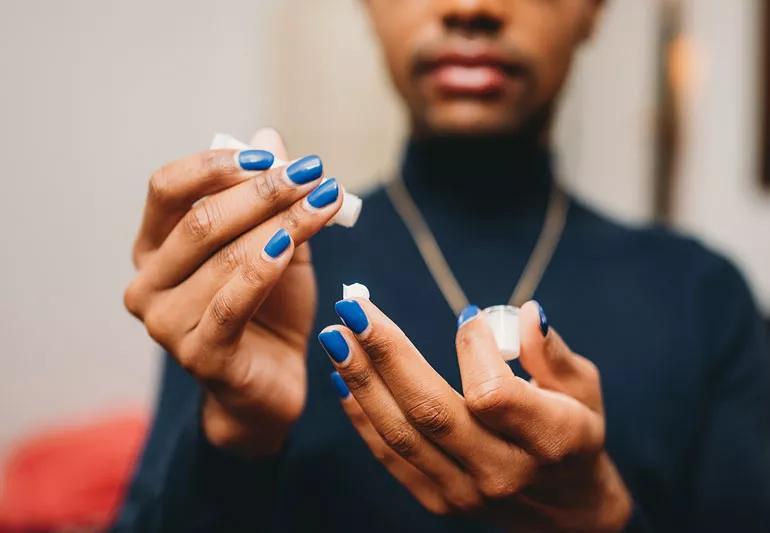This common problem has plenty of solutions, from supplements to slugging

Image content: This image is available to view online.
View image online (https://assets.clevelandclinic.org/transform/ec9b0152-978e-42a6-a530-b81dc24de799/moisturize-Nails-1438626431_770x533_jpg)
Closdup of person moisturizes painted fingernails.
Whether you’re painting them, picking up small objects with them or plucking your guitar with them, we can all agree that strong nails are both useful and cosmetically appealing. If your claws haven’t been cutting it recently, there could be many reasons why. Luckily, there are almost as many ways to strengthen your nails as there are to break them.
Advertisement
Cleveland Clinic is a non-profit academic medical center. Advertising on our site helps support our mission. We do not endorse non-Cleveland Clinic products or services. Policy
Most of the causes of brittle nails are beyond your control — you need to keep washing your hands and there’s no way to turn back the clock. But don’t worry, we have plenty of solutions … on hand.
Dr. Keskinen has several recommendations for keeping your nails from splitting or cracking, but this pearl of wisdom can also keep you healthy: “Keep your fingers away from your mouth. If you tend to bite your nails, then keep them short so you aren’t tempted to chew on dirty nails all day long.”
Advertisement
At bedtime, apply heavy hand cream. During the day, moisturize in between exposure to water or hand sanitizer.
You can also apply a nail conditioner with lanolin a few times a day. Avoid nail conditioners that contain alcohol, because that will further dry out your nail.
If you’re looking to do some extreme moisturizing, nail slugging — a trendy new technique that’s gone viral on social media — might be right up your alley. Nail slugging is the quirky younger sister of face slugging, a practice that’s been popular for several years now.
Slugging, as the name suggests, is a slimy process. After applying skin care products, you cover your hands in a layer of petroleum jelly (or a similarly occlusive product, like an emollient) before going to sleep. The goop traps all that product on your skin, allowing it to more fully seep in.
You could technically slug your nails — or your face for that matter — during the day, but most people would rather be greasy in the privacy of their own homes.
Gel manicures provide a durable coating. Unfortunately, the removal process is damaging to the nail. It’s smarter to skip the gel or, at a minimum, avoid gel manicures in the winter when nails are driest.
Even removing regular nail polish can damage the nail, so Dr. Keskinen suggests choosing a clear polish if you can’t go without a coating. “Find a formaldehyde-free clear polish that you can apply and leave on for a week. If you choose a color and it chips, you’ll have to replace the polish, which dries out the nail.”
“Taking a daily biotin supplement (one with about 5,000 micrograms) can improve nail health,” notes Dr. Keskinen. “To see a difference, you’ll have to wait about six to eight weeks for the entire nail bed to grow out.”
Protein also helps keep nails healthy. Make sure you take in a minimum of 45 grams each day.
The cuticle protects your new nail as it grows out. While manicurists routinely push back or trim the cuticles, it’s better to leave them alone. Moisturizing your hands will keep the cuticles from becoming ragged.
“If your nails are breaking, clip or file them, so they are temporarily shorter,” Dr. Keskinen advises. “By taking protective steps, including moisturizing, you’ll give your nails a chance to grow out less rigid.”
“Drinking water is essential to good health, but you can’t drink your way to more supple nails,” states Dr. Keskinen.
Consuming gelatin doesn’t improve nail health, either. “I drank a lot of gelatin as a teenager,” she says. “I can personally say that it doesn’t work.”
Advertisement
Usually, brittle nails don’t require a doctor visit, but these conditions warrant a call:
While less common, brittle nails can also be a symptom of several medical conditions, including:
If you’ve been diagnosed with any of these conditions, it’s worth visiting your doctor to learn how to manage your symptoms.
Advertisement

Sign up for our Health Essentials emails for expert guidance on nutrition, fitness, sleep, skin care and more.
Learn more about our editorial process.
Advertisement
With repeat injections over time, you may be able to slow the development of new wrinkles
The cosmetic injection may help train your muscles out of frowning, but there’s no hard data to say for sure
This olive oil-based soap is generally mild and safe when diluted
Try turning the heat down on the water and opting for a moisturizing soap
Technique matters — and research suggests most of us still aren’t doing it right
Untreated, some infections can be contagious for up to four weeks!
Living longer is more than just growing older — it’s also about living life to its fullest
The temporary nail damage is bad, but the cumulative UV exposure could be worse
Type 2 diabetes isn’t inevitable with these dietary changes
Applying a hot or cold compress can help with pain
Pump up your iron intake with foods like tuna, tofu and turkey